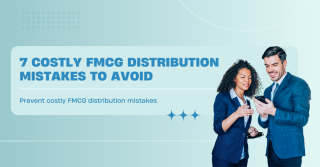Common sales objections and how to overcome them

Sales conversations are a dance—a graceful interplay between presenting value and addressing concerns. While every prospect is unique, there are certain objections that surface repeatedly throughout the sales cycle. The key to success lies not in avoiding these objections but in effectively navigating them.
This blog post equips you with the knowledge and strategies to overcome the most common sales objections, transforming them into stepping stones towards closing deals.
Objections:-
#1: "It's Too Expensive"
This objection often signifies a value disconnect. The prospect might not fully grasp the problem your product or service solves or how it translates into cost savings or increased revenue for them.
Conquering the Cost Barrier:
- Focus on value, not price:
Shift the conversation from price to value. Quantify the return on investment (ROI) your solution offers. Use case studies and data to demonstrate how your product has saved similar businesses money or increased their profits.
- Offer flexible payment options:
Sometimes, creative financing solutions can bridge the gap. Consider offering payment plans, tiered pricing models, or bundled packages that meet the prospect's budget.
- Highlight Hidden Costs:
Many businesses underestimate the hidden costs associated with the status quo. Help the prospect identify these costs (e.g., wasted time, inefficient processes) and show how your solution eliminates them.
#2: "I'm Happy With My Current Provider"
This objection doesn't necessarily mean the prospect is satisfied; it simply indicates a lack of urgency to change.
Breaking the Comfort Zone:
- Uncover pain points:
Probe deeper to understand the prospect's current challenges and frustrations. Maybe their existing provider isn't meeting all their needs, or perhaps there's room for improvement in terms of service or innovation.
- Differentiate Your Solution:
Highlight the unique features and benefits your product offers that the current provider lacks. Emphasize your competitive advantage and how it can address their specific pain points.
- Offer a trial or demo:
Sometimes, a hands-on experience is the best way to convince a prospect. Offer a free trial or demo to showcase the value proposition of your solution and how it can seamlessly integrate with their existing processes.
#3: "We Need More Time to Think About It"
This objection often translates to a lack of decision-making authority or a desire to gather more information.
Moving the needle forward:
- Identify the decision-makers:
Ensure you're speaking to the person with buying power. If you're unsure, politely ask who else needs to be involved in the decision-making process.
- Address specific concerns:
Sometimes, "needing more time" masks underlying concerns. Use open-ended questions to identify any hesitations and address them directly. Provide additional information or clarify product features.
- Offer a Next Step:
Don't leave them hanging. Propose a follow-up meeting or offer to send additional resources that address their specific questions.
#4: "Your competitor [X] offers [Y]"
This objection is an opportunity to showcase your competitive edge.
Standing Out from the Crowd:
- Don't Play the Price Game: Focus on the unique value proposition your product offers, not just the price point. Highlight features and benefits that differentiate you from the competition.
- Leverage customer testimonials: social proof can be incredibly persuasive. Showcase positive customer testimonials and case studies that demonstrate how your solution has addressed similar challenges faced by other businesses.
- Focus on Customer Service: Emphasize the level of customer service and support you provide. Explain how you go the extra mile to ensure customer satisfaction compared to your competitors.
#5: "I Don't Need This Right Now"
This objection often signifies a lack of urgency. The prospect might not fully understand the consequences of inaction.
Creating a Sense of Urgency:
- Quantify the cost of delay:
Help the prospect understand the potential financial or operational impact of not addressing the problem immediately. Use data and case studies to illustrate this point.
- Highlight time-sensitive offers:
Limited-time discounts or special promotions can create a sense of urgency and incentivize the prospect to make a decision sooner rather than later.
- Focus on Future Benefits:
Explain how your solution can help them achieve their long-term goals and objectives. Paint a picture of the positive impact it can have on their business down the line.
Conclusion: Turning Objections into Opportunities
Objections are inevitable in sales, but they don't have to be roadblocks. By viewing them as opportunities to engage in deeper conversations and understand your prospect's needs better, you can transform objections into stepping stones towards closing deals. Remember, the key lies in active listening, addressing concerns directly, and demonstrating the value your product or service offers.
Here are some additional tips to remember:
- Maintain a positive and professional demeanor:
Stay calm, confident, and professional throughout the conversation. An upbeat attitude can be contagious and reassure others of your expertise.
- Ask clarifying questions:
Don't assume you understand the objection fully. Ask clarifying questions to get to the root cause of the prospect's concern.
- Focus on building rapport:
Sales are about building relationships. Take the time to connect with the prospect on a human level and understand their challenges.
- Practice makes perfect.
Role-playing common objections with colleagues can help you develop your response strategies and refine your communication skills.
By mastering these objection-handling techniques, you'll be well-equipped to navigate even the most challenging sales conversations and achieve consistent sales success. Remember, the Delta Sales App can be your secret weapon on this journey.








